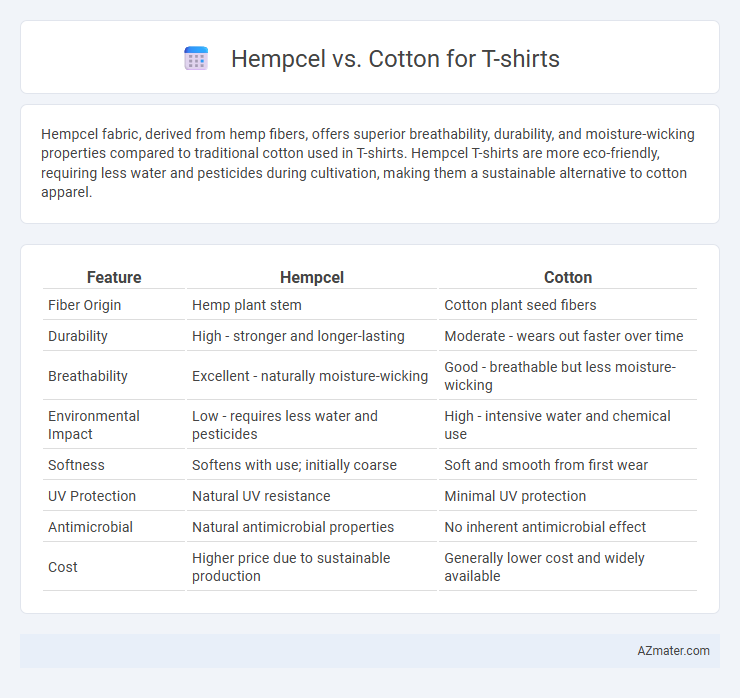Hempcel fabric, derived from hemp fibers, offers superior breathability, durability, and moisture-wicking properties compared to traditional cotton used in T-shirts. Hempcel T-shirts are more eco-friendly, requiring less water and pesticides during cultivation, making them a sustainable alternative to cotton apparel.
Table of Comparison
| Feature | Hempcel | Cotton |
|---|---|---|
| Fiber Origin | Hemp plant stem | Cotton plant seed fibers |
| Durability | High - stronger and longer-lasting | Moderate - wears out faster over time |
| Breathability | Excellent - naturally moisture-wicking | Good - breathable but less moisture-wicking |
| Environmental Impact | Low - requires less water and pesticides | High - intensive water and chemical use |
| Softness | Softens with use; initially coarse | Soft and smooth from first wear |
| UV Protection | Natural UV resistance | Minimal UV protection |
| Antimicrobial | Natural antimicrobial properties | No inherent antimicrobial effect |
| Cost | Higher price due to sustainable production | Generally lower cost and widely available |
Introduction to Hempcel and Cotton Fabrics
Hempcel fabric is derived from hemp fibers, known for their durability, breathability, and natural antimicrobial properties, making them ideal for sustainable T-shirt production. Cotton fabric, sourced from cotton plants, offers softness, comfort, and versatility, widely used in T-shirt manufacturing due to its natural absorbency and ease of dyeing. Both fabrics serve different consumer needs, with Hempcel emphasizing eco-friendliness and longevity, while cotton prioritizes comfort and widespread availability.
Sustainability: Hempcel vs Cotton
Hempcel T-shirts offer superior sustainability compared to traditional cotton due to hemp's rapid growth cycle and minimal water requirements, reducing environmental impact significantly. Hemp fibers require fewer pesticides and herbicides, promoting healthier soil and biodiversity, while conventional cotton cultivation consumes large quantities of water and chemical inputs. Choosing Hempcel over cotton helps lower carbon footprints and supports eco-friendly fashion practices.
Comfort and Wearability Comparison
Hempcel fabric offers superior breathability and moisture-wicking properties compared to traditional cotton, making hemp-based T-shirts more comfortable in hot and humid conditions. The natural fibers of Hempcel are also more durable and resistant to stretching or shrinking, enhancing long-term wearability. While cotton provides a softer initial feel, Hempcel's antimicrobial qualities and improved thermal regulation contribute to a fresher and more comfortable experience during extended wear.
Durability and Longevity: Which Lasts Longer?
Hempcel T-shirts outperform cotton in durability due to hemp fibers being naturally stronger and more resistant to wear and tear, making them ideal for long-lasting garments. Hemp's tensile strength contributes to its resistance against stretching and pilling, while cotton tends to degrade faster with frequent washing and use. Choosing Hempcel over cotton ensures extended longevity, maintaining fabric integrity and appearance through repeated wear cycles.
Environmental Impact Analysis
Hempcel T-shirts have a significantly lower environmental impact compared to cotton due to hemp's natural pest resistance, requiring 50% less water and fewer pesticides during cultivation. Hemp fibers also biodegrade faster, reducing landfill contribution, whereas cotton cultivation accounts for roughly 16% of insecticide use worldwide, exacerbating soil and water contamination. The faster growth cycle of hemp enables higher yields per acre, promoting sustainable land use and lowering overall carbon emissions in textile production.
Moisture-Wicking and Breathability
Hempcel fibers excel in moisture-wicking due to their highly absorbent and quick-drying properties, making them ideal for activewear T-shirts. Cotton, while breathable, tends to retain moisture longer, which can lead to discomfort during extended wear or intense physical activity. The natural structure of hempcel enhances airflow and sweat evaporation, ensuring superior breathability compared to conventional cotton fabrics.
Production Costs and Market Prices
Hempcel T-shirts typically incur higher production costs due to the specialized processing required for hemp fibers, resulting in a price range of $25 to $40 per garment compared to cotton T-shirts, which generally cost $10 to $20 to produce. Cotton benefits from well-established global supply chains and economies of scale, keeping its market prices lower and more competitive in mass production. The rising demand for sustainable textiles is gradually narrowing the price gap, but hemp-based T-shirts still command a premium in most markets.
Skin Sensitivity and Hypoallergenic Properties
Hempcel fabric is known for its natural hypoallergenic properties, making it highly suitable for individuals with sensitive skin due to its ability to resist bacteria, mold, and UV rays. In contrast, cotton, while soft and breathable, can sometimes cause irritation or allergic reactions in people with extremely sensitive skin, especially if treated with chemicals during processing. Hempcel's durability and antimicrobial qualities contribute to a healthier skin environment compared to traditional cotton, reducing the risk of irritation and allergic responses.
Style, Texture, and Color Retention
Hempcel T-shirts offer a natural, rugged texture with a breathable, slightly coarse feel that softens over time, while cotton provides a smoother, softer texture from the start. Hempcel fabric exhibits superior color retention due to its strong fibers and resistance to fading, maintaining vibrant hues longer compared to conventional cotton. In terms of style, Hempcel gives a unique, eco-friendly aesthetic perfect for casual and sustainable fashion, whereas cotton delivers classic versatility suitable for a wide range of designs.
Consumer Trends and Future Outlook
Hempcel T-shirts gain traction due to sustainable qualities, durability, and natural antimicrobial properties, making them appealing to eco-conscious consumers shifting away from conventional cotton. Cotton remains popular for its softness and affordability but faces challenges related to water use, pesticide impact, and slower biodegradability, influencing brand decisions and consumer preferences. Future outlook favors hemp-based textiles as innovation in processing reduces costs, and regulatory support encourages sustainable fashion, positioning Hempcel as a key player in the evolving market.

Infographic: Hempcel vs Cotton for T-shirt
 azmater.com
azmater.com